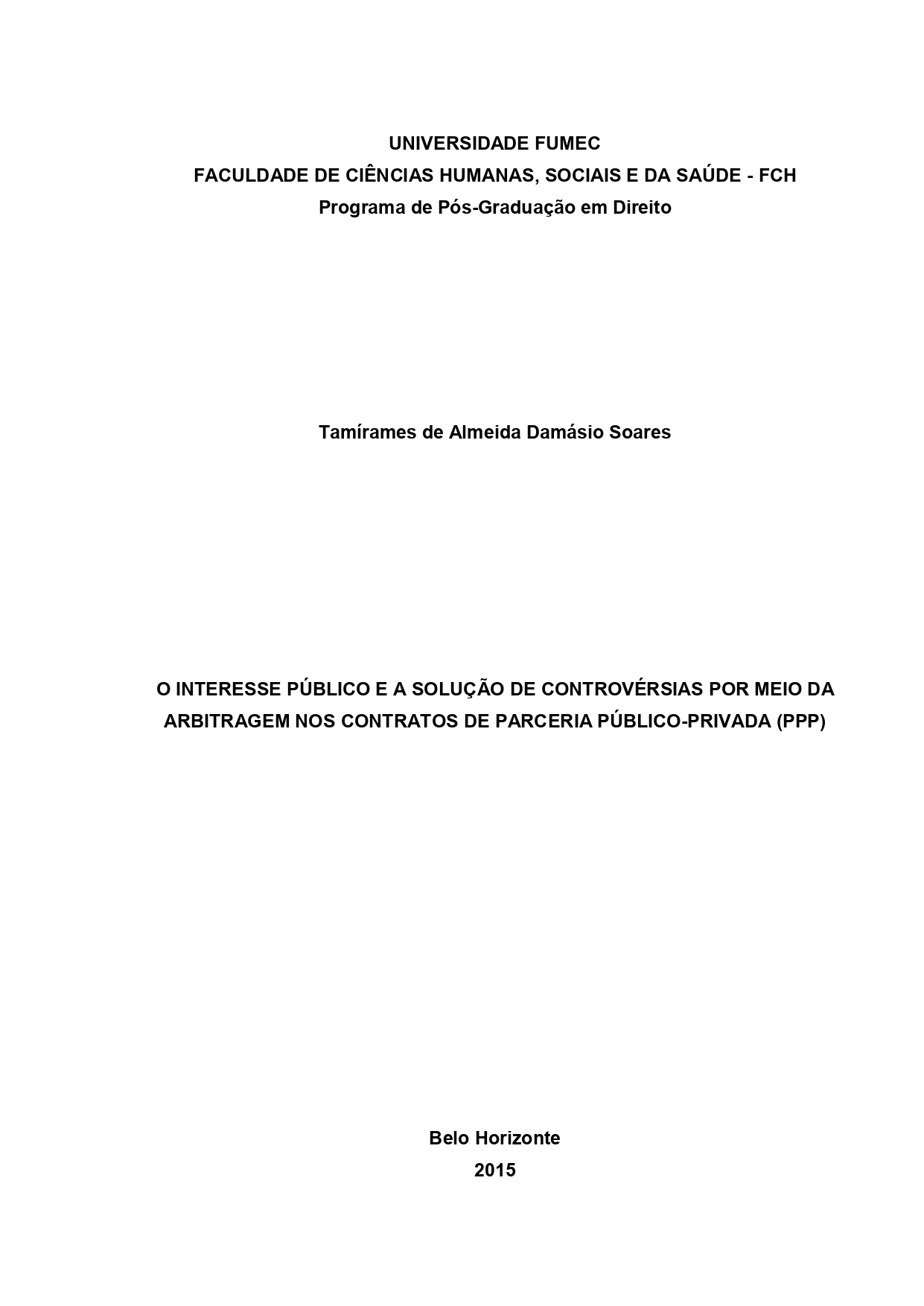O interesse público e a solução de controvérsias por meio da arbitragem nos contratos de parceria público- privada (PPP)

Visualizar/
Data
2015Autor
Soares, Tamírames de Almeida Damásio
xmlui.mirage2.itemSummaryView.MetaData
Mostrar registro completoResumo
Esta dissertação tem como escopo examinar a arbitragem, especificamente no que diz respeito a sua compatibilidade para dirimir controvérsias oriundas de contratos de parceria público-privada, conduzida nos termos da Lei no 9.307/1996, recentemente alterada pela Lei no 13.129 de maio de 2015. O tema foi explorado a partir do estudo do conceito de interesse público primário, desenvolvido por Renato Alessi. Após, realizou-se aprofundado exame sobre o cabimento do instituto da arbitragem nos contratos administrativos e, finalmente, foi analisada a utilização do aludido método à contratação na modalidade de parceria público- privada. As principais teorias relativas à submissão de litígios oriundos dos contratos administrativos à via arbitral foram examinadas e interpretadas com o objetivo de analisar os motivos pelos quais a arbitragem enfrenta obstáculos no âmbito do Direito Público. A partir da análise e refutação das principais teses que negam a admissão da arbitragem nos litígios em que o Poder Público configurar como parte, foi possível confirmar as hipóteses iniciais de que a arbitragem é eficiente meio de solução de controvérsias surgidas da relação contratual envolvendo a Administração Pública e que o referido método alinha-se perfeitamente ao atual modelo de governança administrativa, propiciando, em última análise, que o Poder Público atinja os interesses públicos primários. Atentou-se, ainda, para o fato de que a adoção da arbitragem nas relações que envolvem a Administração Pública possui algumas peculiaridades. Devem ser observados determinados pressupostos jurídicos próprios da natureza do Direito Público. Tais peculiaridades, como a necessidade de a previsão da arbitragem constar em edital de licitação, flexibilização do procedimento arbitral, restrição à confidencialidade, julgamento por equidade e as prerrogativas da Fazenda Pública, entre outros temas, foram abordadas na presente pesquisa. Quanto a metodologia utilizada no desenvolvimento do trabalho, além da revisão bibliográfica e legislativa sobre o tema, realizou-se estudo empírico da adoção da arbitragem nos contratos de parceria público-privada, por meio do exame de 10 instrumentos contratuais celebrados em âmbito estadual e federal. A investigação envolveu especialmente o conteúdo da cláusula compromissória arbitral prevista nos instrumentos analisados. O estudo das decisões dos tribunais pátrios restou parcialmente prejudicado diante da insuficiência de decisões judiciais, impedindo a consolidação de uma análise consistente sobre o assunto. Ao final do trabalho, concluiu-se que a adoção do mecanismo da arbitragem pela Administração Pública nas controvérsias oriundas de contratos de PPP amolda-se perfeitamente ao ordenamento brasileiro e que o mencionado método constitui importante instrumento para a concretização do interesse público primário, respeitadas as devidas peculiaridades inerentes ao Regime Jurídico Administrativo. This essay has the aim to check the arbitration, specifically regarding to its compatibility to settle disputes with resources from the partnership of public-private contracts, carried out with the Law no 9307/1996, recently amended by Law no. 13.129 may 2015. The topic was explored from the study of the concept of primary public interest, developed by Renato Alessi. After in-depth examination was held on the appropriateness of the Arbitration institute in administrative contracts and finally adapted to the use of the aforementioned method to hiring in the public- private partnership mode. The main theories concerning the submission of disputes arising from contracts to the administrative arbitration were examined and interpreted, in order to analyze the reasons why arbitration faces significant obstacles in the Public Law. From the analysis and refutation of the main theses that deny the admission of arbitration in disputes in which the Government set up a party, it was possible to confirm the initial hypothesis that arbitration is an efficient means of resolution of conflicts arising from the contractual relationship involving Public administration and that this method of dispute settlement aligns perfectly to the current model of administrative governance, leading, ultimately, that the Government reaches the primary public interests. It was observed also the fact that the adoption of arbitration in relations involving the public administration has some peculiarities. Should be subject to certain own legal assumptions of the private law nature. Such peculiarities, such as the need for the prediction of arbitration included in the bidding rules, the easing of the arbitration, the restrictions on confidentiality, the trial of fairness and the prerogatives of the Treasury, among other issues, have been addressed in this study. The methodology used in the task development, as well as bibliographic and legislative review on the subject, it was also held an empirical study of the adoption of arbitration in the partnership of public and private contracts, by examining 10 contractual arrangements reaching state and federal level. Finally, there was a behavioral study of public administration and courts before the adoption of arbitration in the public-private partnership contracts, by examining ten contractual instruments entered into by the state and federal public authorities. The research especially involves the terms of the arbitration commitment clause and criticisms relevant to the subject. The behavioral test of the courts remained partially damaged thanks the failure of judicial decisions, blocking the consolidation of an analysis. At the end of the work, it was concluded that the use of the arbitration mechanism by the Public Administration in the controversies from the contracts molds perfectly to the Brazilian legal contracts and that the method mentioned is an important tool for achieving the primary public interest of the State, respecting the peculiarities inherent to Public Law.
